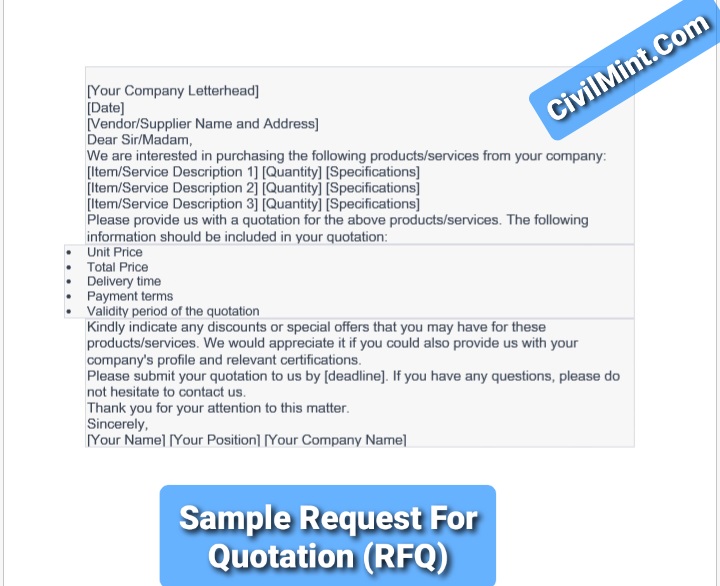What Is Request For Quotation?
Request for Quotation (RFQ) is a common business process widely used in construction, infrastructure and industrial projects. Basically, it is a communication document between two business units.
I have also attached a sample Request for Quotation (RFQ).
See the image below.

The process involves a company or public entity sending a request to suppliers to provide a quotation for the purchase of specific products or services. RFQ is also commonly known as Call for Bids (CfB) and Invitation for Bid (IfB).
In construction, infrastructure and industrial projects, RFQs usually include more than just price per item. Information such as payment terms, per-item quality levels, contract length, delivery schedules and other technical specifications may also be requested during the bidding process. In order to obtain accurate quotes, RFQs often include detailed specifications of goods or services to ensure that all suppliers are bidding on the same goods or services.
The construction, infrastructure and industrial projects industry is highly specialized, and RFQs are best suited for products and services that are as standardized and commodity as possible. This makes each supplier’s bids comparable and helps purchasing organizations determine the fair market value of goods or services and generate savings for the company.
The Internet has made it easy for government agencies, companies and public entities to send RFQs to potential suppliers. Many state-run or vendor-run websites provide lists of RFQs, RFIs (requests for information), and RFPs (requests for proposals). Suppliers may sign up at no charge to receive emails of requests for goods generally or for specific categories of products or services in which they are interested.
Following the RFQ process, professional purchasing organizations must compare quotations and attempt to obtain the best price for the job by negotiation or by conducting an e-auction (a reverse auction or ticker auction). The objective is to determine the fair market value of the goods or services and generate savings for the company.
In construction, infrastructure and industrial projects, RFQs are often used to subcontract work, such as the supply of materials or the provision of services. An RFQ allows various contractors to provide a quote, the best of which will be selected. It also enhances the ability to bid competitively, as suppliers can be certain that they are not the only bidders for products.
RFQ is an important process in construction, infrastructure and industrial projects. They allow companies and public entities to receive quotations from suppliers for specific products or services and compare them to obtain the best value for money.
Detailed specifications are included to ensure accurate quotes and provide legally binding documentation for suppliers. The use of RFQs helps to increase competition, transparency and efficiency in the procurement process, thereby benefiting both companies and suppliers.
